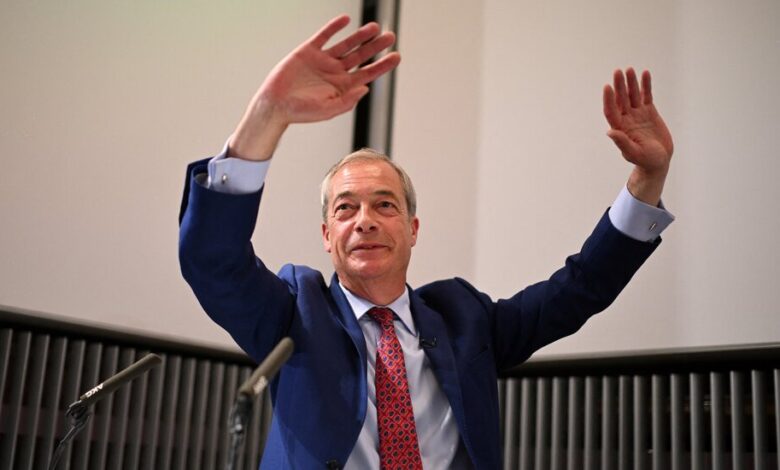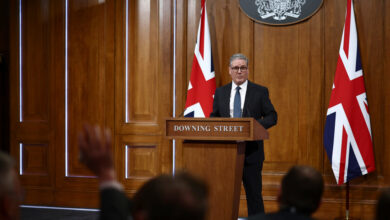Farage and the Future of the British Conservative Party

At first, Nigel Farage kept his cool. When protesters disrupted the election victory speech of Mr. Farage, the veteran British political saboteur, anti-immigration activist and ally of former President Donald J. Trump, he ignored them.
But as the chaos continued at the press conference on Friday, Mr Farage began to fight back, drowning out the criticism by shouting “boring!” into the microphone no fewer than nine times.
Yet when Mr Farage is around, things are rarely boring, as Britain’s centre-right Conservative Party has just discovered to its cost.
Knocked out of power after 14 years by a landslide victory by Labour, the Conservative Party collapsed in its worst defeat in modern history, a shocking defeat that left what remained of the party in disarray. By contrast, Mr. Farage’s tiny rebel party, Reform UK, was on the rise, putting him at the center of the future of Britain’s political right—and perhaps the direction of the country as a whole.
His presence on the political scene, along with his strident anti-immigration rhetoric, could have a significant impact on the direction of the Conservative Party, with the party’s leader, former chancellor Rishi Sunak, announcing on Friday that he would step down once a successor is chosen.
Not only did Reform candidates win five seats in Parliament—including Mr. Farage, for the first time in eight attempts—but the party also won about 14 percent of the vote nationwide. By that measure, Reform was the third-most successful party in Britain, comparable to France’s surging right-wing National Rally.
“Reform has the foundations to mount a serious challenge not just to the Conservatives, but also to Keir Starmer and the Labour Party,” said Matthew Goodwin, professor of politics at the University of Kent, referring to the new Labour prime minister. “The question is whether Nigel Farage can establish an organisation, a party structure and a professional operation that can do the things that he has traditionally struggled to do with his previous parties.”
Flamboyant, combative and charismatic, Mr. Farage, 60, is a divisive figure who has long been an irritant to the Conservative Party, which he left in 1992. During that time, he and his allies have often been dismissed and ridiculed — including once by David Cameron, a former leader who called supporters of the United Kingdom Independence Party, or UKIP, which Mr. Farage then led, “theidiots, lunatics and silent racists.”
But it was pressure from UKIP that forced Mr Cameron to promise to hold the Brexit referendum he lost in 2016, ending his tenure in Downing Street.
Mr Farage recently retired from politics and decided to run in the general election at the last minute. But his impact has been enormous, his anti-immigration campaign hitting a sensitive spot among Conservatives, whose government has presided over a tripling of legal migration since Britain left the European Union.
“He has that in common,” said Tim Bale, professor of politics at Queen Mary University of London. “He is a skilled and charismatic political communicator that many other mainstream politicians — because they have to deal with real issues rather than made-up ones — find hard to match.”
Some right-wing Conservatives want to invite Mr Farage back into their party. Others fear he will repel their moderate voters.
He has suggested that the Reform Party could replace the Conservative Party and that he might even take over the party.
But even without doing any of those things, he still proved the threat he posed.
In 2019, the Brexit Party, then led by Mr Farage, chose not to field a candidate against many Conservative lawmakers, avoiding the risk of a split on the right and helping former Prime Minister Boris Johnson win a landslide victory.
Last week, Mr Farage’s new party struggled in elections across the country, losing dozens of seats to the Conservatives. Professor Goodwin calculates that in around 180 constituencies, the Reform vote was larger than the Conservatives’ margin of defeat.
“They have problems on many fronts,” said Professor Goodwin, noting that the Conservatives have lost votes to Labour and the centrist Liberal Democrats, “but Farage is the biggest problem the Conservatives face.”
The party now faces a crucial decision about who will lead it and what kind of politics it should pursue.
A faction that wants to move to the right to counter Reform has eroded the Conservative vote in pro-Brexit areas of the north and centre of the country in general elections, often allowing Labour to win. Professor Goodwin argues that, after Brexit, Conservative support is now more concentrated among voters who are more socially conservative and hostile to Europe.
But the Conservatives also lost votes to Labour and the small, pro-European centrist Liberal Democrats, who won 72 seats by focusing their campaign on Conservative heartlands in the more socially liberal south of England.
“The Conservatives lost this election on two fronts, but they seem to care more about one than the other,” said Professor Bale. He said the Conservatives appeared to blame Reform for their defeat, while ignoring the fact that the right-wing policies they promised to counter the threat from Mr Farage had cost them votes in the political centre.
The final choice for who becomes Conservative leader is made by party members who tend to be older and more right-leaning than the average British person. “It is hard to imagine that a more moderate Conservative would be chosen by a group of members who are not ideologically and demographically representative of the average voter,” said Professor Bale.
Making matters more complicated for the moderates, the pool of credible candidates was reduced when Penny Mordaunt, a senior cabinet minister, lost her seat in the election, leaving her uncontested.
That bolsters the prospects of right-wing candidates including Priti Patel, the former home secretary; Kemi Badenoch, the former business and trade secretary; and Suella Braverman, another former home secretary. Some of her rhetoric echoed Mr Farage, and she described the arrival of asylum seekers in small boats on Britain’s south coast as an “invasion”.
Some Conservatives hope the scandal-prone but charismatic Mr Johnson – who is not running – could eventually return to fend off the threat from the Reform Party.
The candidate most open to inviting Mr Farage into the Tory fold is Ms Braverman, and analysts do not rate her as a strong candidate. Most of her rivals are wary of Mr Farage, perhaps feeling he would be well placed to overshadow them.
“I don’t think you’ll see a Conservative Party associated with Farage for a long time; he just doesn’t trust the Conservative Party,” said Professor Goodwin.
Speaking ahead of the election, Mr Farage told The New York Times that he “really didn’t see the Conservative Party as we know it being fit for purpose in any way: Brexit has highlighted the divide between the two wings very clearly”. Asked if he could rejoin the party, Mr Farage replied: “That’s not going to happen”.
Assuming that is true, much will depend on his ability to turn the newly formed Reform UK party, which has only basic infrastructure, into a force capable of challenging at the next general election, which must take place in 2029.
That is not certain. In the municipal elections, Reform performed significantly worse than UKIP, showing that its base is not uniform and proving that it is what Professor Bale calls “an AstroTurf party, not a grassroots party”.
Racist and homophobic comments The claims made by some Reform campaigners and candidates have caused outrage, highlighting the difficulty of vetting key supporters.
And Mr Farage, as leader of Reform, has struggled to delegate or share the spotlight. He has also been known to argue with colleagues.
“It is clear that Mr Farage finds it very difficult to accept any opposition or alternative direction for the party proposed by anyone else,” said Professor Bale.
“He’s the ultimate one-man band.”




